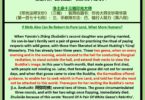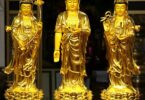皇后往生净土记
Record Of An Empress’ Rebirth In Pure Land
◎ 隋独孤皇后
Suí [Dynasty’s] Dúgū Empress
独孤皇后,河南洛阳人,周大司马河内公信之女也。
Dúgū Empress, [was a] Hénán Luòyáng person, [the] daughter of Zhōu’s minister of war, Hénèi Gōngxìn.
隋文帝未贵时,娶为夫人。及受禅,立为皇后。
When Suí [Dynasty’s] Emperor Wén [was] yet [to be] honoured, [he] married [her] as [his] wife. When [he] accepted abdication [of Emperor Jìng of Northern Zhōu (北周静帝), she was] established as Empress.
性贤明,朝廷政事,多所匡益。然颇妒忌,后宫希得进御。
[With] nature wise [and] capable, [of the] imperial court’s government affairs, many [of] them [were] redressed [with] benefits. However, perhaps [due to] jealousy, [the] rear palace rarely attained advancing [of her] imperial [petitions].
帝宏护佛法,敕诸州郡,遍造灵塔,安置舍利,多感瑞应。
[The] Emperor greatly protected [the] Buddha’s Dharma, decreeing all administrative districts everywhere [to] build relic pagodas, [to] safely house śarīra, [with] many connecting [to have] auspicious responses.
后亦敬慕大乘,常持佛名。当持名时,必先易净衣,嚼沉水香盥口,以为常。
[The] Empress also revered [and] admired [the] Great Vehicle, [and] constantly upheld [the] Buddha’s name. When upholding [his] name, [she] would first change [into] clean clothes, [and] chew agarwood [with] water, [using its] fragrance [to] wash [her] mouth, with [this] as [her] constant [practice].
仁寿二年八月甲子,崩于永安宫,年五十。于时异香满室,天乐振响。
[In] Rénshòu’s second year’s eighth month [of] Jiǎzǐ [i.e. first year of the sixty-year cycle], [she] died in Yǒng’ān Palace, [at the] age [of] fifty. At that time, extraordinary fragrance filled [the] room, [as] heavenly music rose [and] sounded.
帝问梵僧阇提斯那:「是何祥也?」
[The] Emperor asked [the] Indian monk Dūtísīnà, ‘What [do] these signs [mean]?’
对曰:「净土有佛,名阿弥陀,皇后往生,故现斯瑞耳。」
In reply, ‘[The] Pure Land has [a] Buddha, named Āmítuófó, [with the] Empress reborn [there], thus appearing [with] these auspicious signs.’
(隋书,续高僧传,佛祖统纪)
(Book [Of] Suí, Continuation [Of] High Monastics’ Biographies, [The] Buddhas’ [And] Patriarchs’ Chronicles)
《净土圣贤录》
(Record [Of] Pure Land’s Noble Sages):
卷九 • 往生女人第九
Ninth Scroll: Ninth [Section On] Reborn Women
彭希涑撰
Compiled [By] Péng Xīsù
Namo Amituofo : Translation by Shen Shi’an





